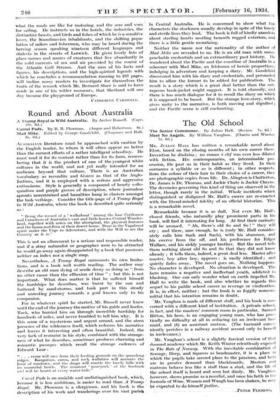The Old School MR. JULIAN HALL has written a remarkable
novel about Eton, based on the closing months of his own career there. Invention he disdains ; no roman it clef was ever less diluted with fiction. His contemporaries,_ an interminable 'pro- cession, file past us in their habit as they lived. In their surnames a syllable or so is different ; in other respects, from the colour of their hair to their choice of a career, they are photographic copies from life. Dr. Alington is Chatteiton, Dr. James is Dr. Thomas, and Jackie Chute is Jackie Cheyne. The decencies governing this kind of thing are observed in the letter, though rarely in the initial. Whole incidents which distinguished or disfigured Mr. Hall's career are re-enacted with the literal-minded fidelity of an official historian. 'This is a remarkable novel.
:Remarkable because it is so dull. Not even Mr. Hall's closest friends, who naturally play prominent parts in his book, will find it interesting for long. At first their curiosity will be aroused. " Ah, there's old So and So ! " they will cry ; and there, sure enough, he is (only Mr. Hall consider- ately calls him Such and Such), with his stammer, and his swerve from the off, and his preference for Edgar Wallace, and his sickly younger brother. But the novel tells them nothing about old So and So that they did not know already ;- it tells them, indeed, a great deal less. Master after master, boy after boy, appears : is easily identified ; , and quietly fades away. The novel goes on. Nothing hapPens. No character is developed. No situation is developed. The hero remains a negative and ineffectual youth, addicted to blushing. One can only wonder what on earth impelled Mr. Hall to write the book, and. also whether he regards this sequel to his public school career as revenge or vindication. It is, in effect, neither ; but the book is so foggily noncom-
mittal that his intention remains in doubt. • Mr. Vaughan is made of different stuff, and his book is con-
cerned with a different kind of institution. A private school, in fact, and the masters' common room in particular. Samuel Bitton, his hero, is an engaging young man, who has prac- tically no difficulty at all in seducing (a) an irrelevant ,bar- niaid, and (b) an assistant matron. (The barmaid conve- niently perishes in a railway accident second only to herself in irrelevance.)
"Mr. Vaughan's school is a slightly farcical version otthat
doomed academy which Mr. Keith Winter relentlessly exposed in The Rats of Norway. With the inevitable combination of Scrooge, Heep, and Squeers as headmaster, it is a place in which the pupils take second place to the passions, and beds are in greater demand than blackboards. Masters and matrons behave less like a staff than a stud, and the life of the school itself. is heard. and seen but dimly. Mr. Vaughan. however, shows promise as a novelist, and once his faith in the formula of Wine, Women and Waugh has been shaken,- he may be expected to do himself justice.
--PETER FLEMIliG.








































 Previous page
Previous page